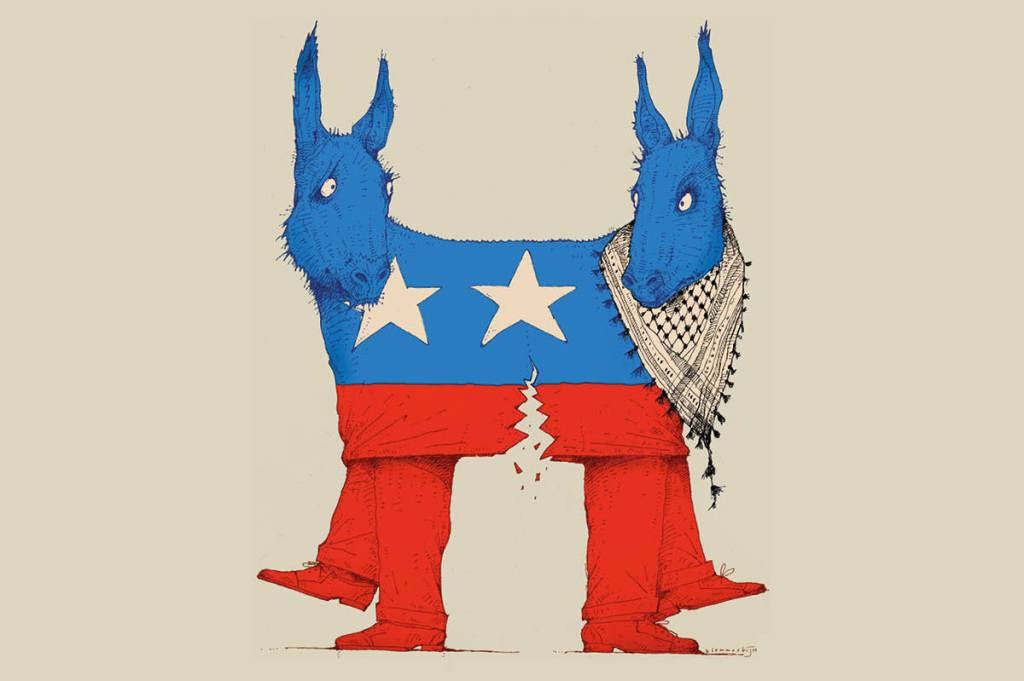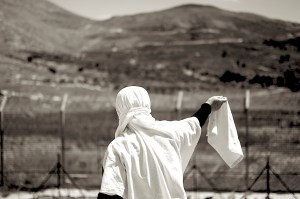The migraine arrived suddenly and unexpectedly — a headache of global proportion that made every sound a shrieking cacophony, impossible to ignore. Tuning it out, as the Democratic coalition had managed to do successfully for the better part of a decade, was no longer an option. The nightmare had arrived, and it had a throbbing mantra, carried across the bluest corners of the country in pixels and TikToks and in the bellow of a boiling mass of blathering, megaphone-wielding youths: “From the river to the sea.”
Even before the horror of the October 7 attack and the war on Hamas that followed, Israel has carried the potential to cause political tribulation for Democrats in the post-Obama era. As much as Joe Biden publicly based his campaign on a “battle for the soul of America,” repeatedly invoking the specter of Charlottesville and drawing a direct line from it to Donald Trump, enemy of all things good and true, anyone who paid more than scant attention to American politics understood the difference between the “Jews will not replace us” expressions of hatred on the right and the rise of antisemitism on the left. One end of the horseshoe came in the form of a fringe group of pimple-faced, khaki-clad tiki-torch wielders — the other as a rising group of anti-Israel progressives who are also duly elected members of the United States Congress.
The member at the center of the Democrats’ antisemitism controversy is Rashida Tlaib, a Detroit-born Muslim and daughter of a former Ford Motor assembly line worker. In 2018, she won 31 percent of the vote in a six-way primary to replace John Conyers, one of the longest-serving members in the history of Congress, in a solidly Democratic district. Her embrace of anti-Israel rhetoric since arriving in Congress plays all the hits: she regularly refers to Israel as an “apartheid state.” She has accused those who vote against the Boycott, Divestment and Sanctions movement of dual loyalty, saying they “forgot what country they represent.” She retweets cartoons with antisemitic tropes, speaks to groups denounced for their anti-semitic rhetoric and even all the way back in 2020 her office had to delete a tweet containing that key phrase: “From the river to the sea.”
In an emotional speech to demonstrators gathered on the National Mall less than two weeks after the Hamas attacks, Tlaib pointed the finger at the head of her party.
“To my president, to our president… I want him to know, as a Palestinian American and also somebody of Muslim faith, I’m not going to forget this. And I think a lot of people are not going to forget this,” Tlaib said. “President Biden, not all Americans are with you on this one and you need to understand that. We are literally watching people commit genocide and killing the vast majority just like this, and we still stand by and say nothing. We will remember this.”
The speech was followed two weeks later by a video posted to Twitter/X, in which Tlaib called out Biden for “betrayal” and “supporting the genocide of the Palestinian people.” The video included a clip of Benjamin Netanyahu thanking Joe Biden for his unequivocal support. It featured footage pulled from the many anti-Israel marches across the United States in previous weeks, highlighting chants of “no peace on stolen land,” “the occupation’s got to go,” and, of course, from protesters chanting “from the river to the sea.”
Challenged by some of her colleagues, Tlaib was quick to assert her purity of heart: the phrase, she insisted, is “an aspirational call for freedom, human rights and peaceful coexistence.” And she actually seemed to believe this convenient fiction would fly as a defense. But her escalating rhetoric and social media activity finally prompted a rare rebuke when more than twenty of her fellow Democrats joined Republicans to pass a censure resolution, just one step below removal from Congress. Partisan loyalty can only go so far.
Democrats have a massive Israel problem. It took the worst mass murder of Jews since the Holocaust to bring it home to them, but they should have seen the sea change in their coalition long before. For as much as the 2018 elections of Tlaib, Alexandria Ocasio-Cortez, Ilhan Omar and Ayanna Pressley were met with enthusiasm by progressive activists and the media, it was clear at the time that the group would be brought to heel by Nancy Pelosi. The then-speaker smiled as she posed with Ocasio-Cortez and Omar on the cover of Rolling Stone, navigated around their fiercest public comments — and prevented their agenda, for the most part, from becoming central to the Democratic mission. (Defunding the police? “That’s not the position of the Democratic Party,” she told George Stephanopoulos.)
The message was clear. The Squad could be a shiny multiracial symbol of pride for the left, but that’s all they were going to be under Pelosi — their legislative effectiveness reduced to AOC crying on the floor in 2021 as another billion dollars for Israel’s Iron Dome passed with overwhelming bipartisan support.
Yet since their arrival in Washington, the Squad’s political energy has steadily grown. With the additions of would-be police-defunder Cori Bush, the fire-alarm-pulling Jamaal Bowman, thirst-striker Greg Casar and Summer Lee, who positively compared the BDS movement to Black Lives Matter, the progressives have become much louder in the absence of clear leaders from the old Democratic guard. You can’t trade Pelosi for Hakeem Jeffries without expecting some drop-off. But in foreign policy, where what politicians say arguably matters more than what they can actually do legislatively, that drop-off has consequences.
For many Americans — Democrat, Republican and independent — the assumption of support for Israel is automatic and deeply ingrained. Support for Israel is especially strong among Christians who embrace a vision of America as a fundamentally Judeo-Christian nation, but also among an older class of Democrats who lived through the racial tensions of the Eighties and early Nineties and strongly wish to avoid a repeat of the unrest.
Yet for younger Americans, especially those on the left, the consoling narrative of persecution, victimhood and occupation has taken hold across a spectrum of issues that prominently includes the Palestinian conflict. Their sympathies have shifted dramatically in recent years. For more than two decades, Gallup has regularly surveyed Americans on the question: “In the Middle East situation, are your sympathies more with the Israelis or more with the Palestinians?” March 2023 marked the first time that more Democrats — 49 percent to 38 percent — said they were more sympathetic toward the Palestinians. This movement is clearly driven by younger voters: a Pew report from spring 2022 found that “US adults under thirty view the Palestinian people at least as warmly (61 percent very or somewhat favorable) as the Israeli people (56 percent) and rate the Palestinian government as favorably (35 percent) as the Israeli government (34 percent).”
This rising tendency was mostly the subject of detached analysis until it started to affect the Biden presidency. A November 2023 NBC News poll which found the president at his lowest rating ever put it in stark terms: “The erosion for Biden is most pronounced among Democrats, a majority of whom believe Israel has gone too far in its military action in Gaza, and among voters ages eighteen to thirty-four, with a whopping 70 percent of them disapproving of Biden’s handling of the war.”
On campuses and in the streets, this generational divide was felt immediately. Protests exploded at colleges across the country, as clashes between students and faculty at prominent universities left Jewish students feeling under siege and alumni reacting with horror. Longtime donors to institutions like Harvard, Columbia and the University of Pennsylvania pulled funding and denounced the insufficient reactions from administrators. At George Washington University, a pro-Palestine student group was suspended after projecting “glory to our martyrs” on a wall mere blocks from the State Department. And in Southern California, a local professor was arrested for involuntary manslaughter, accused of striking a sixty-nine-year-old Jewish protester Paul Kessler with a megaphone and knocking him to the ground. Kessler, who had been waving the flag of Israel at a peaceful march in Thousand Oaks, was pronounced dead from blunt force trauma.
The left’s Israel divide can be explained in part by the difference in the educational priorities of the academic left of today, spread like wildfire through TikTok and social media, and the older generation of Democrats who remember a time before fifteen seconds ago. (It’s perhaps no coincidence that one of Tlaib’s first prominent reactions to criticism was to call for a boycott of HBO host Bill Maher, an ACLU Democrat from the age when the ACLU was actually about academic freedom and civil liberties.)
The racial issues that split the Democratic coalition in the Eighties and early Nineties led to Republican success with tough on crime policies even in blue parts of the country, as black leaders openly pushed antisemitic narratives. Consider an incident from the career of just one of these figures who still plays a grandfatherly role on the left: the Rev. Al Sharpton, a fixture of Democratic politics and media for half a century. As Philip Klein summarized in a 2019 piece for the Washington Examiner:
In August 1991, a Jewish driver accidentally ran over a seven-year-old black boy named Gavin Cato in Crown Heights, Brooklyn and an antisemitic riot broke out in which Jewish rabbinical scholar Yankel Rosenbaum was stabbed to death. Instead of calling for calm, Sharpton incited the rioters, leading marches in the streets that included chants of “No Justice, No Peace!” and “Kill the Jews!”…
After an investigation, no indictment was made of the driver who had accidentally run over Cato, and he left for Israel. Sharpton flew there in an attempt to “hunt down” the driver and hand him a civil lawsuit. According to the Daily News, at Tel Aviv’s Ben Gurion Airport, a woman spotted Sharpton and shouted, “Go to hell!” Sharpton yelled back: “I am in hell already. I am in Israel.”
It was only after then-Arkansas governor Bill Clinton’s signature Sister Souljah moment in 1992, when he criticized the rapper’s “anti-white” rhetoric in his campaign address to Jesse Jackson’s Rainbow Coalition, that Democrats found their messy way through this tension to repeatedly win the popular vote and the White House. Barack Obama’s rise represented the hope of some voters in the possibility of a “post-racial” America, that “a soul and kosher coalition” could be realized. In 2020, Kamala Harris attempted to score points against Joe Biden on school busing, which won her support from the media, but was rejected by the voters: they were still holding on to that hope.
But it turned out to be false, in part because other than the odd “beer summit” moment, Obama turned out to be uninterested in such a project, then and now. A month after the Hamas attacks, the former president sat for an interview with his Pod Save America chums, denouncing what the terrorists did as “horrific,” but immediately turning to blame Israel: “the occupation, and what’s happening to Palestinians, is unbearable.” “Nobody’s hands are clean… all of us are complicit to some degree.”
It was another of Obama’s habitual “it’s everybody’s fault, America” moments, and a break with Biden’s public affirmation that we “will continue to have Israel’s back… today, tomorrow and always.” Given the opportunity to denounce the intense rhetoric of Tlaib and her ilk, and to stand behind the administration of his former vice president, Obama took a pass.
The fundamental problem for the Democratic congressional coalition is that “from the river to the sea” is by no means out of step with the principles of its progressive left members. Despite the fact that Israel is a liberal society by any measure, the current leftist dynamic that has played out over the past several decades loathes its existence and identifies Israel as yet another “settler colonialist” power. Support for this idea has become mainstream among the loudest young progressives in politics and media. The speed with which they turned the conversation from horror at the rape and murder of peaceful Israelis to calls for ceasefire and warnings against overreach was so rapid, it called to mind the classic Norm Macdonald joke: “What terrifies me is if ISIS were to detonate a nuclear device and kill 50 million Americans. Imagine the backlash against peaceful Muslims.”
In late November, Senate Majority Leader Chuck Schumer said that the latest wave of antisemitism was coming from “people that most liberal Jewish Americans felt previously were their ideological fellow travelers.” And smart Democrats understand that electoral success is unlikely to come from echoing the messages of the Democratic Socialists of America, Black Lives Matter, the DEI agenda, the CRT agenda, the 1619 Project or any part of the corporatized and monetized decolonization agenda which promotes blame and victimhood. But they’ve now spent years allowing these projects to gain power within the Democratic Party, with little response. They’ve put them at the podium and given them glossy profiles, even as the Squad emphatically insisted that Israel is an apartheid state that should be expunged from the planet. The academic left taught them to think, the Democrats bought them a mega- phone — and now they are shouting through it. And when the Biden-Pelosi generation is gone, who will be left to stop them?
This article was originally published in The Spectator’s January 2024 World edition.


























Leave a Reply